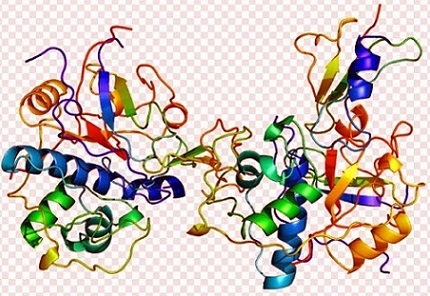Nikhil Prasad Fact checked by:Thailand Medical News Team Jul 14, 2024 1 year, 4 months, 4 weeks, 1 day, 23 hours, 29 minutes ago
COVID-19 News: Discovering the Hidden Roles of CD74
A groundbreaking study from the Ludwig Maximilian University of Munich-Germany has shed light on the significant role of the CD74 protein in immune response, particularly in the context of COVID-19. This
COVID-19 News explores the key findings of the research, which reveals CD74 as a crucial receptor in activated CD4+ T cells, and its implications for severe COVID-19 cases.
 CD74 is a key player in immune response and COVID-19 severity
Understanding CD74: Beyond Antigen Presentation
CD74 is a key player in immune response and COVID-19 severity
Understanding CD74: Beyond Antigen Presentation
CD74, commonly known for its role in antigen presentation within the major histocompatibility complex (MHC) class II, has been identified as a high-affinity receptor for macrophage migration inhibitory factor (MIF). MIF is a cytokine involved in various inflammatory conditions, cardiovascular diseases, and cancers.
Despite previous knowledge of CD74's presence in T cells, its functional relevance remained poorly understood. This article delves into the study's comprehensive characterization of CD74 expression regulation and its impact on T-cell migration, function, and COVID-19 disease stages.
Key Findings: CD74's Role in T-cell Activation and Migration
The research team used flow cytometry, Western blotting, immunohistochemistry, and RNA sequencing to analyze the MIF receptor profiles in resting and activated CD4+ T cells. They discovered that while CD74 is not measurably expressed on the surface of resting T cells, it is present intracellularly.
Upon activation, CD74 is significantly upregulated, modified by chondroitin sulfate, and detectable on the cell surface. This upregulation facilitates MIF-induced T-cell migration.
Detailed Mechanistic Insights
Proximity ligation assays revealed the formation of CD74/CXCR4 heterocomplexes on activated T cells. These complexes were significantly reduced after MIF treatment, suggesting a MIF-mediated internalization process. Additionally, the study showed that in a cohort of 30 COVID-19 patients, those with severe disease had significantly higher CD74 surface expression on both CD4+ and CD8+ T cells compared to those with mild disease.
The researchers used advanced techniques to trace the intracellular journey of CD74. Immunofluorescent staining highlighted CD74's presence in the endoplasmic reticulum and lysosomes, indicating its involvement in complex cellular processes beyond antigen presentation. The post-translational modification by chondroitin sulfate appears to be a crucial step in CD74's translocation to the cell surface, which is vital for its function as a MIF receptor.
CD74 and CXCR4: A Synergistic Partnership
The study highlighted the interplay between CD74 and CXCR4 in T-cell migration. CXCR4 is known for its role in T-cell trafficking to inflammatory sites. The researchers found that MIF-induced chemotaxis in activated T cells was completely blocked
when either CD74 or CXCR4 was inhibited, underscoring the critical role of these receptors in immune cell migration.
Exploring the Impact of CD74 in COVID-19 Patients
The study's findings have significant implications for understanding COVID-19 pathology. The upregulation of CD74 in severe COVID-19 patients suggests its potential as a biomarker for disease severity. This could pave the way for targeted therapies aimed at modulating CD74 activity to manage severe inflammatory responses in COVID-19 and other diseases.
In the cohort of 30 COVID-19 patients, CD74 surface expression was markedly higher in those with severe disease. The researchers measured the expression of CD74 on both CD4+ and CD8+ T cells, finding that the levels were significantly elevated in patients with more severe symptoms. This correlation suggests that CD74 could serve as a predictive marker for COVID-19 severity, helping clinicians identify and treat high-risk patients more effectively.
Implications for Future Therapies
The comprehensive analysis of CD74's role in T-cell activation and migration provides new insights into immune response mechanisms. This research not only highlights the importance of CD74 in immune regulation but also opens avenues for developing novel therapeutic strategies targeting CD74 to treat severe inflammatory conditions, including COVID-19.
Potential Therapeutic Approaches
Given the findings, potential therapeutic approaches could involve modulating CD74 activity to control excessive immune responses. By targeting CD74, it may be possible to reduce inflammation and tissue damage in severe COVID-19 cases, improving patient outcomes. Additionally, understanding the interplay between CD74 and other MIF receptors like CXCR4 could lead to combination therapies that more effectively manage immune responses.
Conclusion: Paving the Way for New Therapeutic Strategies
The discovery of CD74 as a key functional receptor in T-cell activation and migration marks a significant advancement in immunology. The research provides a deeper understanding of the complex roles of CD74, particularly in the context of severe inflammatory diseases like COVID-19.
As we continue to battle the COVID-19 pandemic, findings like these are crucial for developing better diagnostic and therapeutic tools. The potential to use CD74 as a biomarker for disease severity could transform how we identify and treat patients at risk of severe outcomes. Moreover, the insights gained from this study could have broader implications for other inflammatory and autoimmune diseases, offering hope for more targeted and effective treatments.
The study findings were published in the peer-reviewed journal: Cellular and Molecular Life Sciences.
https://link.springer.com/article/10.1007/s00018-024-05338-5
For the latest
COVID-19 News, keep on logging to Thailand Medical News.
Read Also:
https://www.thailandmedical.news/news/covid-19-news-study-uncovers-the-role-of-macrophage-migration-inhibitory-factor-receptor-cd74-in-t-cell-immune-responses-to-sars-cov-2
https://www.thailandmedical.news/news/study-finds-that-cd74-and-d-dopachrome-tautomerase-plays-a-role-in-covid-19
